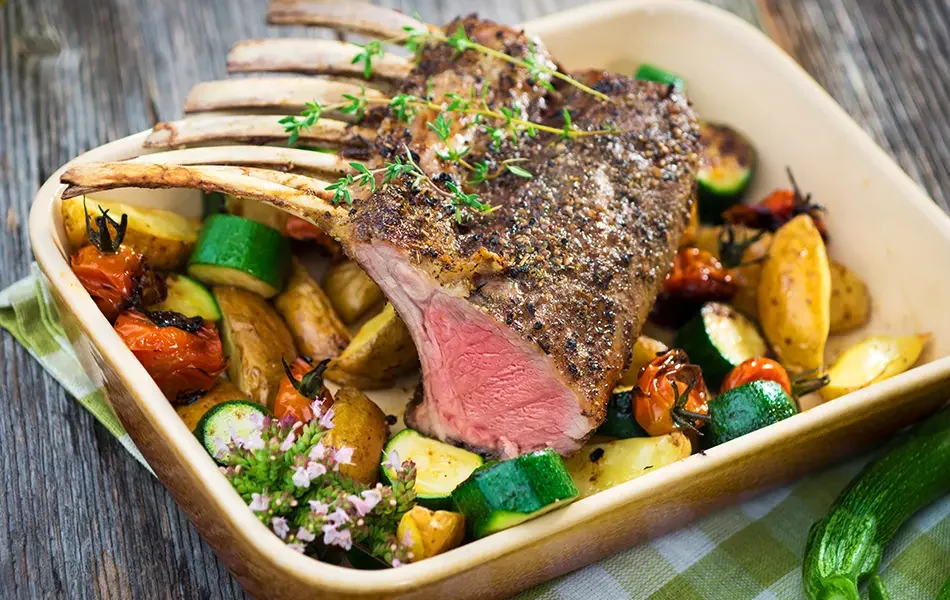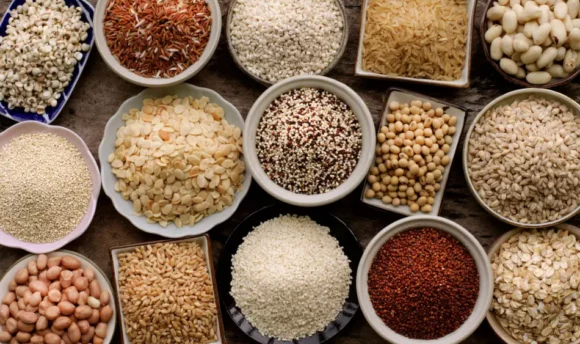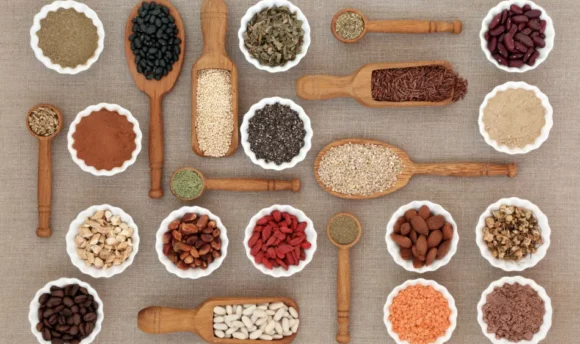Is Lamb Healthy? Nutrition Facts and Health Benefits
Lamb, being a mild and tender meat, can spice up many dinners. Most people love having it with roast, but is this meat good for you? We provide the nutrition facts of lamb and determine whether it has any health benefits.

Lamb is a very popular meat that fits into any healthy diet. Not only does it contain important nutrients, but it also tastes delicious.
Although it is a nutrient-dense food, you may wonder if lamb has any benefits. Red meat usually gets a bad rap when it comes to healthy eating. Learning about the nutritional value of lamb could be a good way to determine its value in your diet.
Keep reading to discover the benefits and risks of eating lamb meat.
Is Lamb Healthy?
Yes, lamb is healthy because it contains essential minerals and vitamins. You can eat this nutrient-dense food on a balanced diet. However, just be aware that lamb does contain a high amount of saturated fat, so always monitor how much you have to stay healthy.
Lamb meat comes from young sheep. It’s a popular food that compliments roast dinners and vegetable-based dishes due to its succulent flavor. The benefits of lamb meat make it perfect for a balanced diet since the protein and amino acids keep you functioning properly.
One advantage of eating lamb is its monounsaturated fat content. Those who eat monounsaturated fat have lower cholesterol levels. You need plenty of healthy fats to stay energized throughout the day and experience better workouts when trying to lose weight.
These benefits can sound pleasing, but you have to limit your portions of lamb. Too much of it could have opposite effects on your health. Lamb does still contain saturated fat, cholesterol, and a high number of calories that might lead to weight gain or heart-related issues.
The way you cook lamb meat can also determine how healthy it is. For example, adding too much oil to lamb steaks may lead to increased saturated fat. Instead, cook the meat in a healthy tomato sauce and mix it with spinach, onion, asparagus, or radishes.
5 Health Benefits of Lamb Meat
Lamb contains essential amino acids and vitamins that could improve your health. Just make sure you buy fresh ground lamb or lamb chops if you want to make healthy meals.
Below are some health benefits of lamb:
#1 Supports muscle growth
One excellent thing about lamb is that it contains lean protein. The amino acids from protein will fuel muscle growth and help the body to burn stubborn fat. Even though lamb is red meat, the protein content can keep you strong, especially if consumed in moderate amounts.
#2 Improves exercise performance
Lamb contains beta-alanine, which is a type of amino acid that produces carnosine. This natural antioxidant decreases fatigue and encourages better exercise performance. You can eat small pieces of cooked lamb with salad to boost your energy before intense exercise.
#3 Boosts immunity
Conjugated linoleic acid, often found in grass-fed lamb, can boost immune function. It’s a type of fat that helps your immune system become more resistant to infections. You should get more conjugated linoleic acid on your diet if you regularly get sick or experience stomach bugs.
#4 Reduces inflammation
Lamb is a rich source of omega-3 fatty acids. Eating more of these healthy fats can reduce inflammation in your arteries and stomach. Zinc, being an immune-boosting mineral, also has anti-inflammatory effects that could heal your body and maintain optimal immune health.
#5 Helps with digestion
The conjugated linoleic acid, protein, and vitamin B12 in lamb meat can support good digestion. You can experience less constipation, bloating, and gas on a balanced diet. Stronger digestive functions also help those with irritable bowel syndrome (IBS) or leaky gut symptoms.
3 Downsides of Lamb Meat
Lamb meat has some disadvantages that need to be considered. You need to learn more about what you’re eating if you wish to maintain a healthy and balanced diet.
Here are the downsides to eating lamb:
#1 Might cause high cholesterol
Lamb is a high-cholesterol food that could damage your arteries. This is only true when you eat too much of it alongside other bad foods like garlic bread or fat-rich gravy. People with high cholesterol levels should limit this meat on their diet to prevent artery and heart damage.
#2 Contains saturated fat
Consuming too much saturated fat can pose certain health problems. Some of these problems comprise weight gain and an increased risk of diabetes. Lamb does contain important minerals, but you should still measure out each portion to ensure you’re not eating lots of trans fats.
#3 May cause high blood pressure
Any type of grass-fed lamb meat could trigger high blood pressure spikes. This is due to it being red meat that contains saturated fat, cholesterol, and a moderate number of calories. Aim to consume lamb moderately and eat more foods like lean beef, chicken, eggs, and turkey.
Nutrition Facts of Lamb
Learning more about lamb meat and what it contains can help you decide whether it’s suitable for your diet. This is especially important if you plan on losing weight or building lean muscle mass.
Here is the nutritional information for 100 grams of lamb:
Nutritional value (per 100g)
| Calories/ Nutrient (per 100g) | Amount |
| Calories (kcal) | 292 |
| Net Carbs (g) | 0 |
| Fiber (g) | 0 |
| Sugar (g) | 0 |
| Fats (Total) | 20.8 |
| Saturated Fats (g) | 8.76 |
| Protein (g) | 24.3 |
| Cholesterol (mg) | 96 |
Source: https://fdc.nal.usda.gov/fdc-app.html#/food-details/2341311/nutrients
Moderate amount of calories
Ground lamb meat contains a decent amount of calories. You can still eat this meat on a weight-loss diet, but you have to monitor your servings. Research suggests that consuming too many calories can increase the risk of heart disease, weight gain, diabetes, and high blood pressure.
High in protein
One great thing about eating lamb is the high protein content. People who are strength training to build muscle can consume this meat. Protein isn’t just good for muscle growth since it curbs hunger cravings, prevents muscle loss, and speeds up your recovery after exercise.
High in fats
Saturated fats make up half of the overall fat percentage in lamb. This may cause health issues for those who eat too much lamb meat throughout the week. A study found that saturated fat can increase LDL cholesterol in your body and promote cardiovascular disease.
Zero carbs
Those who are following the keto diet can eat lamb meat. This is because it contains no carbohydrates, meaning it won’t break ketosis. Reducing the number of carbs you eat on a balanced diet can prevent weight gain and encourage your body to burn more fat.
Rich in minerals and vitamins
Lamb contains iron, phosphorus, selenium, and vitamin B12. Studies have proven that vitamin B12 can support bone health and increase energy levels. Meanwhile, iron keeps your red blood cells healthy, which prevents iron deficiency problems like anemia and tachycardia.
High in cholesterol
Foods that are high in cholesterol can increase the risk of atherosclerosis. This happens when too much cholesterol builds up in your arteries. Although lamb is nutrient-dense meat, you should monitor how much you eat if you suffer from high blood sugar or blood pressure.
Lamb vs. Beef
Here is a comparison between lamb and beef:
| Lamb | Beef | |
| Taste | Robust, grassy, earthy | Savory, juicy, slightly sweet |
| Serving | Lamb is often served with a roast dinner comprising baked potatoes and honey-roasted carrots | Beef compliments burgers and meals that use gravy or side dishes like potatoes and salad |
| Calories per 100g | 292 | 176 |
| Protein per 100g | 24.3 | 27.7 |
| Total fats per 100g | 20.8 | 6.36 |
| Net carbs per 100g | 0 | 0 |
| Sodium per 100g | 379mg | 54mg |
| Cholesterol per 100g | 96mg | 85mg |
Healthy Lamb Recipe
You should make your own dinners using lamb meat to stay healthy. This ensures you’re not buying lamb that has been processed or contains preservatives. It’s worth eating this type of meat with cooked vegetables to gain more essential vitamins and minerals in your diet.
Below is a healthy lamb recipe you can make at home:
Ingredients
- 1 tbsp olive oil
- 250g lamb filet (free from fat)
- 140g shallot
- 2 courgettes
- ½ tsp ground cumin
- ½ tsp paprika
- ½ tsp ground coriander
- 3 bell peppers
- 1 sliced garlic clove
- 5fl oz vegetable stock
- 250g tomatoes
- Chopped cilantro leaves (handful)
Directions
- In a large frying pan, heat the olive oil and add your lamb slices.
- After 1–2 minutes, mix the shallots with the lamb until they are golden.
- Stir in the courgettes and cook for another 3–4 minutes.
- Add the three spices, peppers, and garlic, making sure everything is well-mixed. Reduce to moderate heat and cook for 4–5 minutes until the ingredients have softened.
- Pour the vegetable stock over the mixture. Add the cherry tomatoes and cover the frying pan with a lid to let simmer for 15 minutes.
- Stir occasionally to ensure the vegetables are tender and cooked.
- Before serving, sprinkle some cilantro on top of the dish.
You can find more healthy recipes by downloading some nutrition apps. There are plenty of meal ideas that could help you incorporate nutrient-dense foods into your diet. Apps can also offer more guidance when it comes to making food at home or buying fresh ingredients.
FAQs
Lamb is considered red meat because it contains more myoglobin. This is a protein that can make certain meats look dark before and after cooking. Red meats often have a bad reputation, but lamb is a high-quality source of nutrients that can provide the same benefits as white meat.
Yes, lamb can be great for weight loss due to the lean protein. Eating enough protein can help you burn stubborn fat while building muscle. Some people like to add cooked lamb slices to a dish mixed with spinach, tomato sauce, red onion, cauliflower, and honey for the perfect meal.
Lamb is a relatively lean meat because it contains less fat compared to other meats. However, chicken, turkey, pork, and beef are better lean sources that you should incorporate into your diet. Just make sure you’re choosing raw cuts of meat that haven’t been heavily processed.
Grass-fed lamb can taste very similar to lean beef. They both have an earthy flavor that is stronger than other common meats you can buy. If you don’t like a strong meaty taste, lamb might not be right for your meal options, but it’s worth trying when creating a balanced diet.
A Word From a Nutritionist
Lamb is one of the best meats you can eat on a balanced diet. This is due to the high-quality protein and monounsaturated fats that keep you healthy. People who eat lamb could have stronger muscle growth and maintenance while protecting their heart from diseases.
However, don’t forget that lamb is red meat. Any type of red meat is more processed compared to chicken, turkey, and rabbit. Even though lamb is packed with vitamins and
minerals, you should aim to eat it 1–2 times a week when keeping your health in check.
Consider pairing lamb chops with sweet potato, carrots, cauliflower, and garlic seasoning. You can enjoy this roast dinner knowing it will feed you important nutrients. It’s also worth eating lamb with a green salad containing avocado and red onion if you want to lose weight.
Conclusion
Lamb is a healthy meat that can fuel your body with essential vitamins and minerals. You could add it to your roast dinner or put a few cooked slices in a vegetable wrap. Just make sure to monitor how much you eat on a balanced diet if you’re planning to lose some body fat.

















































 Select your language:
Select your language: 








